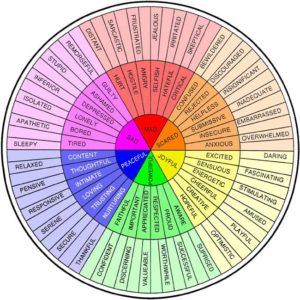
The other day, both a bad thing and a good thing happened. My son—the one with ADHD—had a meltdown after lunch over his math homework. Maybe you’re thinking, I missed the “good” part. Good part: I realized he hadn’t melted down in a long time. So we were actually able to tease apart some of the factors for the meltdown (math after lunch, when his brain is tired; worrying that he wouldn’t get enough time to mess around at the pool after swim practice). We had time to deal not just with the meltdown, but to recognize it as the dashboard light it was—and hopefully circumvent it in the future.
One of the things I’m loving about some friends who’ve done the hard work of going—and responding to!—counseling is their remarkable capacity to love even better. As they’re combing out some of the tangles in their brains, everyone around them is cashing in on more enjoyable, meaningful interactions. My point? The time we spend investing in our homes’ emotional health pays untold dividends both to people around us now, and the countless ones in the future—including generations to come. Here, I’ve compiled some new and best-of ideas to take us to the next level (including yours truly).
Never underestimate the impact of a healthy home.
- Process meltdowns; name your emotions. (See the story above!) Rather than a hot, steaming pile of emotional mess, we can help our kids—as Dr. Dan Siegel dubs it—“name it and tame it.” When we can name what’s going on inside of us, it has less power over us. (And naming them builds emotional intelligence, right?)
![]() We’ve got this wheel (at right) posted on our fridge now (download a pdf version here). Being able to describe what we’re undergoing also helps us communicate—and therefore build the relationships between us. This post, Questions to Know Thy (Stressed) Self and The Stressed Version of Your Marriage, may help, too.
We’ve got this wheel (at right) posted on our fridge now (download a pdf version here). Being able to describe what we’re undergoing also helps us communicate—and therefore build the relationships between us. This post, Questions to Know Thy (Stressed) Self and The Stressed Version of Your Marriage, may help, too. - Create some “nothing” space. As in, on the calendar. One of the positive takeaways from the recent studies on mindfulness indicate that we need time in our days to—get this—simply let our minds wander. See, our “upstairs brain”—the cerebrum–is the part of our brain which controls impulses, examines emotion, empathizes (all those processes that make us human!). It’s constantly receiving signals from the more primally-reacting parts of our brain (our “downstairs” brain). The upstairs brain, as Seigel likes to say, helps process our downstairs brain with empathy, higher level reasoning, impulse control, etc. But if the upstairs brain gets overloaded with signals from the downstairs…you’re looking at someone “losing control” in an emotional outburst. (See the helpful video below.)
When we overload our family schedules, we’re not giving our kids—or us—a lot of time to simply process what’s going on. And that’s just the beginning of some of the beautiful reasons for margin. We can better seat our sense of value in not working for God, but “a deep interior life with God,” as Peter Scazzero writes in Emotionally Healthy Spirituality. Freer, simpler schedules help us steer clear steering clear of “becoming ‘human doings’ rather than ‘human beings.”
- Perfectionism vs. Pursuit of Excellence. Yep, there’s a difference. Our homes thrive not on fear and perfection, but on humility and grace.
- Cultivate an “I’m sorry/I forgive you” culture in your home. Peter Scazzero, author of (the can’t-recommend-it-enough) Emotionally Healthy Spirituality, writes, “Another helpful way to measure your level of brokenness is to consider how offendable we are…a broken person…is so secure in the love of God that she is unable to be insulted.” Tim Keller, too, notes in this wise podcast that pride makes fools of us—because it makes us unable to accept criticism, either because we’re struggling with inferiority or superiority. Both are hyperfocused on self. Gently encourage kids to take responsibility for what they do wrong, rather than blame-shifting. Talk openly about both strengths and weaknesses in ways that see everyone as being in a process. As a parent, model an eagerness to seek forgiveness for even the smallest infractions. For more ideas in this vein, check out 10 Ideas: Living the Gospel in Your Home.
- Help your kids know the difference between judging others and discernment—and model the constant extension of grace to those you talk about.
- Protect your kids with honest conversations. See this post on [Talking about] Sex Begins in the Kitchen.
- Start tackling your anger issues. Honestly, until I had kids…I had no idea I had an anger problem. Here are some key ideas that have helped me—and in turn, changed our home, and how I could help my kids deal with blowing their own tops.
- Know Your Kids’ “Soul Holes.” When you understand the core questions or needs driving your child, you’re more able to respond not just to the outward behavior, but address the heart attitude. You might also like Is Insecurity Robbing Your Family?
- One of the most important ideas I’ve read of late: Shame Parenting vs. Guilt-Exposure. This one’s transforming my home.
- Siegel and Tina Payne Bryson, authors of No-Drama Discipline: The Whole-Brain Way to Calm the Chaos and Nurture Your Child’s Developing Mind, recommend three key questions in any discipline situation:
- Why did my child act this way? (When answering, consider your child’s comprehensive circumstances.)
- What lesson do I need to teach in this moment?
- How can I best teach this lesson? Often, the reactive part of a child’s brain is in charge, overwhelming her ability to reason. So perhaps you wait until she’s calmed down to engage issues beyond the immediate moment.
- Hone in on strategies for repeat “crisis” moments.
- What are the habitual problem areas where the emotional temperature in our house rises? Maybe it’s getting out the door in the morning, Sunday mornings before church, bedtime, the homework hour, or the dinner hour with those toddlers. Pick one.
- Isolate the key stressors: Is it a child that’s typically not handling a situation well? Does packing lunches, making breakfast, and helping search for that single lost shoe again create the perfect morning storm?
- In response, create strategic organization. Do some research, and take some time to pray. Can we have a go-to plan for kid entertainment of those hungry toddlers (or does one get a bath in the kitchen sink)? Do we need to plan 15 extra minutes of margin before we leave? Can kids lay out clothes the night before?
Here’s to a more “wholehearted ” week at your house.
Help us out: What great advice has truly helped you to be a more nurturing parent? Comment below!

 We’ve got this wheel (at right) posted on our fridge now (
We’ve got this wheel (at right) posted on our fridge now (





